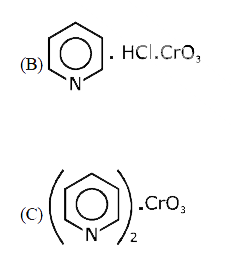Collin's reagent is
MNO2/HCl
MNO4/C2H5N
K2Cr2O7/H2SO4
Cr2O3/2C5H5N
The correct Answer is:D
Step-by-Step Solution:
1. Understanding the Question: The question asks about "Collin's reagent." We need to identify what it is and its components.
2. Identifying Collin's Reagent: Collin's reagent is a specific reagent used in organic chemistry, particularly for the oxidation of alcohols to aldehydes and ketones. It is made from chromium compounds.
3. Components of Collin's Reagent: The main components of Collin's reagent are chromium trioxide (CrO3) and pyridine (C5H5N). It is typically used in a solvent like dichloromethane (CH2Cl2).
4. Chemical Reaction: When Collin's reagent is used, the chromium trioxide oxidizes the alcohol, while pyridine acts as a base to facilitate the reaction.
5. Conclusion: Therefore, Collin's reagent can be summarized as a mixture of chromium trioxide and pyridine, often used in organic synthesis for oxidation reactions.
Final Answer: Collin's reagent is a mixture of chromium trioxide (CrO3) and pyridine (C5H5N), used for the oxidation of alcohols.
---
Topper's Solved these Questions
- D & P-BLOCK ELEMENTSBOOK - ERRORLESS CHAPTER - D & P-BLOCK ELEMENTSEXERCISE - Critical Thinking
21 Videos
- D & P-BLOCK ELEMENTSBOOK - ERRORLESS CHAPTER - D & P-BLOCK ELEMENTSEXERCISE - JEE Section (Only one choice correct answer)
38 Videos
- D & P-BLOCK ELEMENTSBOOK - ERRORLESS CHAPTER - D & P-BLOCK ELEMENTSEXERCISE - JEE Section (Numeric answer type questions)
2 Videos
- COORDINATION CHEMISTRYBOOK - ERRORLESS CHAPTER - COORDINATION CHEMISTRYEXERCISE - JEE(ADVANCED 2018 MORE THAN ONE CHOICE CORRECT ANSWER
1 Videos
- ELECTROCHEMISTRYBOOK - ERRORLESS CHAPTER - ELECTROCHEMISTRYEXERCISE - Jee Section JEE (Advanced) 2018 (Numberic answer Type Questions)
2 Videos
Similar Questions
Oxidation OF Alkene||Hydroxylation OF Alkene (Syn Hydroxylation, Anti Hydroxylation)||Oxidation OF Alcohol using NBS, PCC, PDC, Sarett's Reagent, Collin's Reagent, MnO2, TsCl, DMSO, NaHCO3, Oppenaur Reduction, MPV Reduction, and Example
View SolutionColumn - I
(A) Oxidation of 1∘ alcohol in aldehyde

Oxidation of alkyne into acid
Column-II
(P) KMnO4,Δ,overeset(Θ)(OH)
(Q) Collin’s reagent
(R ) Jone’s reagent
(S) PCC
View Solution
Knowledge Check
Collin's reagent can cause the conversion of
A>CO→>CHOHB−CHO→−COOHC−CH2OH→−CHOD>CHOH→−COOH.Tollen's reagent is
Aammonical CuSO4Bammonical AgNO3Calkaline solution containing complex of copper nitrateDnone of theseTollen's reagent is
Aammoniacal cuprous chlorideBammoniacal cuprous oxideCammoniacal silver bromideDammoniacal silver nitrate
Tollen's reagent is
View SolutionTollen's reagent is
View SolutionWhich of the following will reduce Tollen's reagent as well as Fehling's reagent?
View SolutionJone's reagent is
View SolutionAssertion (A) Selectivity of Collin's and Corey's reagent is due to the absence of water.
Reason (R) In the presence of water, aldehyde form the aldehyde hydrate which reacts with H2CrO4 to form chromate ester and subsequently undergoes oxidation to carboxylic acid.
View Solution
